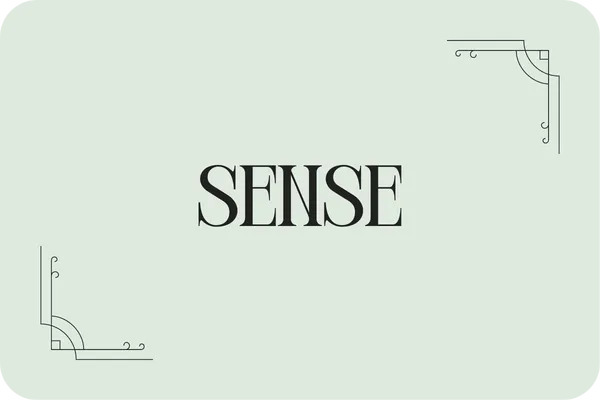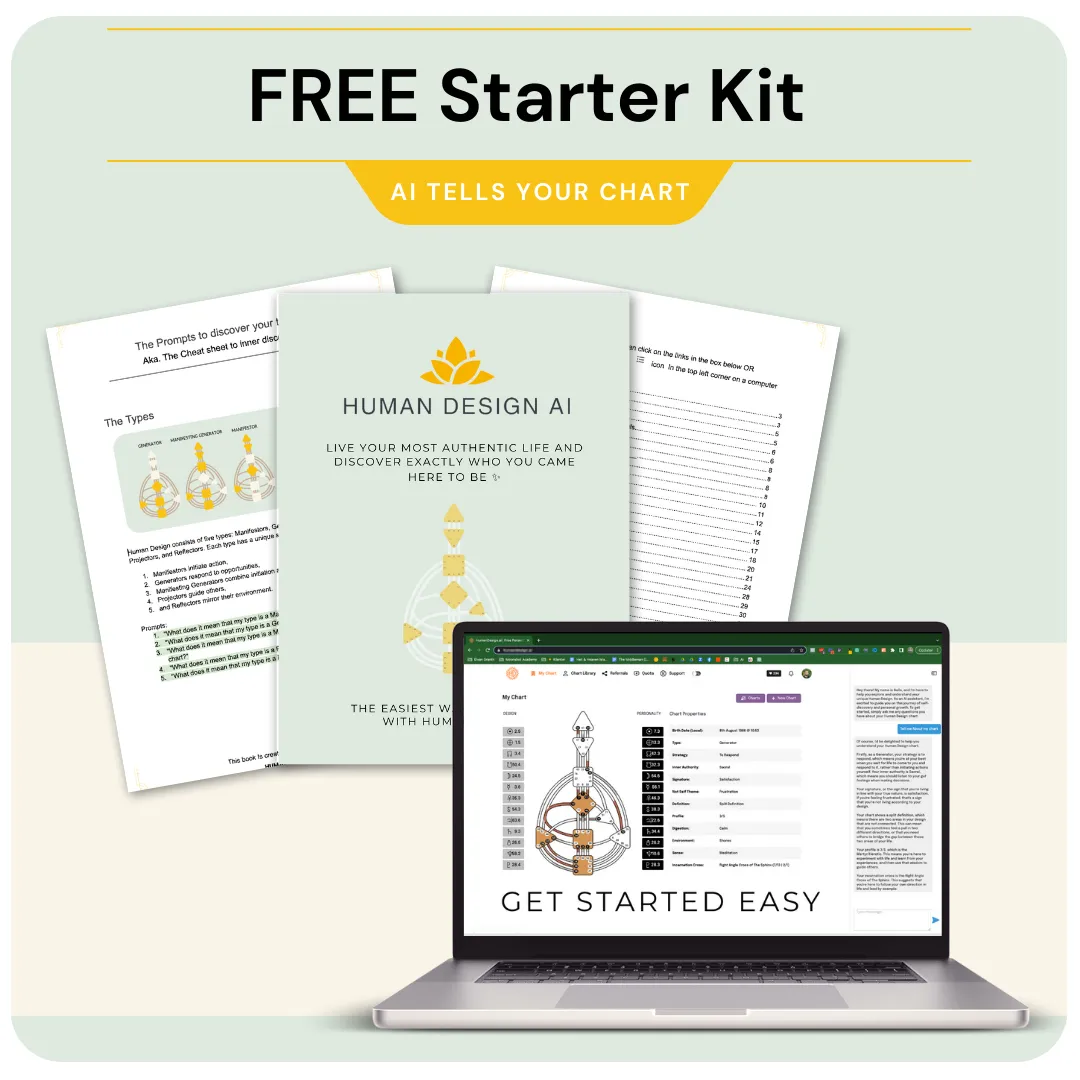
The Human Design Blog ✨
I wanna read about...

Beginners Guide to Human Design - Sense
“Each of us has a unique way of sensing the world. Understanding this can greatly enhance our experience of life.” - Ra Uru Hu
Table of Contents
Introduction to Human Design and the Seven Senses
Brief Overview of Human Design
Understanding the Seven Senses in Human Design
Exploring Each Sense
Smell
Taste
Outer Vision
Inner Vision
Feeling
Touch
Cognition
How the Senses Influence Our Lives
Interpreting and Interacting with the World
Health and Wellness
Decision Making
Determining Your Dominant Sense
Reading Your Human Design Chart
How to Cultivate Your Senses
Mindfulness and Awareness
Healthy Habits
Conclusion
FAQs

Beginners Guide to Human Design: Understanding the Seven Senses
Introduction to Human Design and the Seven Senses
Brief Overview of Human Design
Human Design is a comprehensive system that reveals the mechanics of human nature, allowing us to understand our uniqueness and potential. It combines several disciplines including astrology, the I Ching, the Kabbalah, and the chakra system, offering a unique perspective on the human experience.
Understanding the Seven Senses in Human Design
In Human Design, the seven senses play a crucial role in how we perceive and interact with the world. These senses include smell, taste, outer vision, inner vision, feeling, touch, and cognition.
Exploring Each Sense
Smell
Smell, or olfaction, is often underestimated but plays a critical role in our perception of the world. In Human Design, it is linked to our primal instinct and survival. It serves as an intuitive signal, guiding us toward or away from people, places, or situations. Smell connects us with our deepest, often subconscious, responses, helping us navigate life with an inherent understanding beyond intellectual reasoning.
Taste
Taste, scientifically known as gustation, in the Human Design context, goes beyond the physical sensation of tasting food. It's metaphorically about savoring life, about determining what experiences, relationships, or tasks are nourishing for us. The sense of taste symbolizes discernment—the ability to judge what is beneficial or harmful. Those with a dominant taste sense often have a strong instinct for what is truly nourishing, physically, emotionally, and spiritually.
Outer Vision
Our Outer Vision is not limited to seeing with our eyes. It expands to include how we view our external world, how we interpret visual cues, colors, patterns, or even broader scenarios in our lives. A person with a dominant Outer Vision sense is often keenly observant, able to capture nuances, read visual cues, and see the larger picture. They're often artistic or design-oriented, able to translate their unique vision into their surroundings.
Inner Vision
Inner Vision pertains to our introspective capabilities and imaginative faculties. It's about our ability to dream, visualize, and perceive images or ideas within our mind. This sense is crucial for envisioning future possibilities, reflecting on our experiences, and understanding our subconscious mind. Individuals with a dominant Inner Vision often have a rich inner life. They're dreamers, visionaries, and innovators, able to envisage and bring forth ideas that others may not see.
Feeling
In the Human Design system, the sense of feeling transcends physical sensation. It's about emotions, empathy, and intuition. It is our emotional compass, guiding us through life by allowing us to experience joy, sadness, excitement, fear, and a myriad of other emotions. Those dominant in this sense are often highly empathetic, emotionally aware, and deeply intuitive, capable of sensing the emotional climate of their surroundings and responding accordingly.
Touch
The sense of Touch in Human Design is about physical sensation and connectivity with our environment. It signifies our direct interaction with the world around us, how we experience the tangible elements of life. It's about closeness, connection, and physical interaction. People with a dominant sense of Touch are often tactile learners, hands-on individuals who understand the world through direct contact. They value the physical presence and touch of others and express their care through tactile means.
Cognition
In Human Design, Cognition is about intellectual processing, critical thinking, and problem-solving. It signifies our ability to comprehend, reason, learn, and make connections. It is this sense that enables us to form coherent thoughts, solve problems, and gain a deeper understanding of complex concepts. Individuals with dominant Cognition often possess strong analytical abilities, excel in logical reasoning, and have a keen interest in learning and intellectual pursuits.
How the Senses Influence Our Lives
The seven senses in Human Design are integral to our life experience. They shape our interactions with the world and inform our decisions. Let's delve into some ways in which our senses play a crucial role in our lives.
Interpreting and Interacting with the World
Our senses are the primary conduit through which we perceive the world. They help us interpret the reality around us and shape our reactions to it. For instance, our sense of Smell can warn us of danger, such as a gas leak or a fire. Our Outer Vision allows us to navigate our physical environment, while Inner Vision enables us to dream and visualize possibilities. Feeling allows us to connect with others emotionally, and Touch lets us experience physical connection and comfort.
Health and Wellness
The role of our senses in maintaining our health and wellness cannot be overstated. Our sense of Smell and Taste play crucial roles in food selection, helping us identify and enjoy nutritious food and avoid spoiled or harmful substances. Our Outer Vision alerts us to potential hazards in our environment, while our Touch lets us feel pain, which often signals that something is wrong. Moreover, being attuned to our senses—both the physical and the metaphorical—enables us to live in harmony with our bodies, our surroundings, and our nature, promoting overall wellness.
Decision Making
Our senses also significantly influence our decision-making processes. Our Cognition allows us to process information, analyze situations, and make logical decisions. Simultaneously, our Feeling guides us in making decisions based on our emotions and intuition. For example, we may choose a job not only because it makes intellectual sense (pay, benefits, career growth) but also because it feels right—we're excited about the role, resonate with the team, and feel aligned with the company's values.
Determining Your Dominant Sense
Understanding your dominant sense can give you invaluable insight into your inherent nature and how you can best navigate the world. Each of us possesses all seven senses, but our Human Design chart can reveal which sense is most pronounced in us. Your dominant sense is the one that comes most naturally to you—the one you've likely relied on for years, even without realizing it.
Reading your Human Design chart with a trained analyst can help you identify your dominant sense. Alternatively, self-reflection and observation of your patterns and tendencies can also provide clues. Do you navigate life primarily through your gut feelings? Or perhaps you're a visual person, relying heavily on your Outer Vision? Recognizing your dominant sense can serve as a valuable tool for self-awareness and personal growth.
How to Cultivate Your Senses
Just like any other skill or ability, our senses can be cultivated and enhanced through practice and conscious attention. Here are some ways to nurture your senses in alignment with your Human Design.
Mindfulness and Awareness
Mindfulness is the practice of focusing your attention on the present moment and accepting it without judgment. This practice can be extremely beneficial in tuning into your senses. Whether it's savoring the flavors in your meal, observing the colors of the sunset, or paying attention to your feelings during a conversation, mindfulness brings you into direct contact with your sensory experience.
Healthy Habits
Maintaining a healthy lifestyle can significantly enhance your sensory abilities. Regular exercise, a balanced diet, adequate sleep, and hydration all contribute to your overall health, which in turn affects your sensory performance. For instance, a healthy diet rich in essential nutrients can improve your senses of Taste and Smell. Regular physical activity can enhance your Touch and Outer Vision by improving your coordination and spatial awareness.
In conclusion, understanding and harnessing your senses according to the Human Design system can open new avenues for self-discovery, personal growth, and fulfillment. By attuning to your dominant sense and cultivating all seven senses, you can navigate life with greater ease and authenticity, enriching your overall human experience.
FAQs
Here are some common questions about the seven senses in Human Design:
1. What are the seven senses in Human Design?
The seven senses in Human Design include Smell, Taste, Outer Vision, Inner Vision, Feeling, Touch, and Cognition.
2. How do the senses influence us in Human Design?
Our sensesshape our perception of the world, our health, and our decision-making processes in Human Design. They are the conduit through which we interact with the world and interpret our experiences.
3. How can I determine my dominant sense?
Your dominant sense can be determined through your Human Design chart, which requires your birth data. By studying your chart or working with a Human Design analyst, you can identify your dominant sense. Alternatively, self-reflection and keen observation of your tendencies and reactions can also provide insight.
4. How can I cultivate my senses?
You can cultivate your senses through practices like mindfulness, meditation, and maintaining a healthy lifestyle. Being present and attentive to your sensory experiences, practicing sensory exercises, and ensuring your overall physical health can all contribute to enhancing your senses.
Understanding Human Design and its seven senses provides an intriguing lens to view and interpret our human experience. By aligning with our unique design, we can live more authentically, make decisions that truly resonate with us, and ultimately lead a more fulfilling and meaningful life. The journey of self-discovery through Human Design is a continuous one, with each step revealing more about our inherent nature and potential. As we cultivate and attune to our senses, we learn to navigate life in harmony with our design, enriching our experiences and expanding our understanding of ourselves and the world.
“Our Sense in Human Design is the window through which we perceive the Universe.” - Ra Uru Hu


